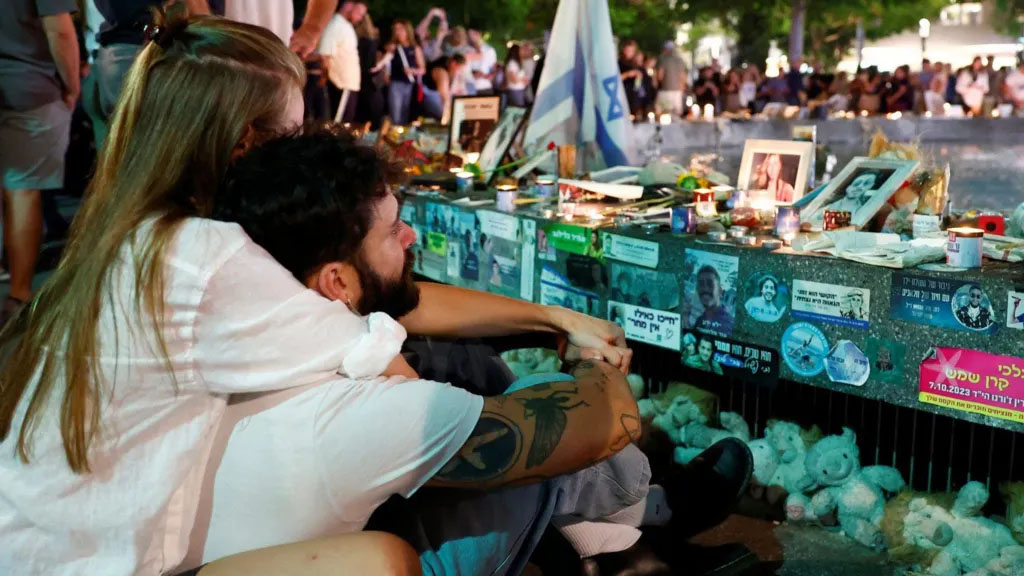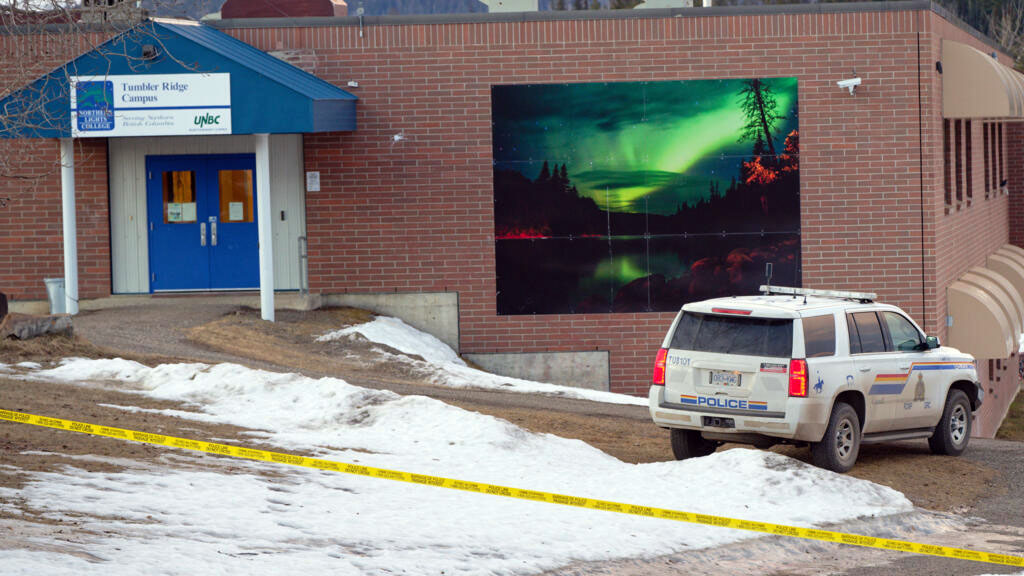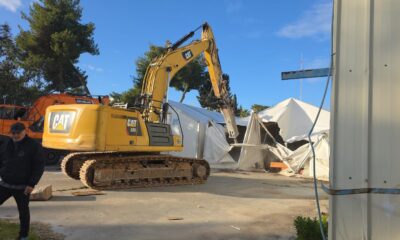International
Israel marks one year of Hamas attack as fighting rages

Israel marks one year of Hamas attack as fighting rages
Israel has held ceremonies to remember the victims of the mass killings and abductions carried out by Hamas on 7 October 2023, against a backdrop of continuing fighting in the Gaza Strip and Lebanon.
A year on from the attack – that saw some 1,200 people killed and 251 taken hostage – Israeli PM Benjamin Netanyahu vowed to stop such an assault happening again, saying Israel’s armed forces were “changing the security reality” of the region.
Since 7 October, nearly 42,000 people have been killed during Israel’s offensive in Gaza, according to the Hamas-run health ministry.
As the day of commemorations unfolded, Israel said it had intercepted more than 100 rockets fired by Hezbollah in Lebanon as well as projectiles launched by Yemen’s Houthis and from Hamas in Gaza.
Overnight, rocket warning sirens continued to sound in northern Israel, and several more town were declared closed military zones, as Israel looks set to expand its ground offensive across the Lebanon border.
On Tuesday morning, the Israel Defense Forces (IDF) said Suhail Hussein Husseini, Hezbollah’s logistics commander, was killed in a “precise, intelligence-based strike in the area of Beirut” on Monday. Hezbollah has not commented.
Husseini was responsible for the budgeting and logistical management of Hezbollah’s most sensitive projects, including its war plans and other special operations, the IDF said.
The US has indicated that it supports targeting Hezbollah in Lebanon – but fears that what has been described as a limited operation by Israel could quickly turn into a larger-scale, prolonged conflict.
And as American and Israeli officials discuss Israel’s response to last week’s unprecedented Iranian missile attack, CIA director William Burns has warned that there is a “very real danger of a further regional escalation”.
Last October, gunmen from Hamas in Gaza broke through the border fence and rampaged through nearby Israeli villages, Kibbutzim, military posts and the Nova music festival.
READ ALSO:
- Gov Ododo approves N72,500 minimum wage for Kogi workers
- I’ve done everything possible for peace to reign in Rivers – Fubara
- Fishermen kill Hippopotamus in Kebbi river after attack
On Monday, families of the hundreds killed and dozens of people taken hostage at the festival gathered at the site early for the first memorial event of the day.
Holding pictures of loved ones they listened to the last track played at the festival before Israeli President Isaac Herzog led a minute’s silence at 06:29, the moment that the attack began.
In nearby communities also attacked by Hamas gunmen, smaller events were held.
Elsewhere, Netanyahu visited the Iron Sword memorial in Jerusalem for victims of the Hamas attacks, lighting a candle to “remember our fallen, our hostages”.
In Tel Aviv’s biggest park, Israeli families gathered for an event billed as the Bereaved Families Memorial Ceremony, which served as an alternative to the official government memorial ceremony.
Some of Israel’s most popular singers gave emotional performances, while images of victims flashed on the screens.
The stage was adorned with items symbolising the attacks including burnt and broken cars from the Nova music festival, and a child’s bicycle and swing set from the Be’eri kibbutz.
Outside Israel, US President Joe Biden joined other world leaders in condemning what the “unspeakable brutality” of the Hamas attacks a year ago.
He also expressed horror at the subsequent war, saying “far too many civilians had suffered, far too much”.
Mourners also gathered at vigils around the world including in Australia, South Africa, Germany and the US.
In the UK, Sir Keir Starmer told the House of Commons he supported Israel’s right to defend itself. But Britain’s prime minister insisted there was no military solution to the current crisis and appealed for all sides to “step back”.
However as the memorial services took place, the wider conflict in the region raged.
The Israeli military said Hezbollah had fired more than 130 rockets across the border from Lebanon. Most were shot down, but some hit the cities of Haifa and Tiberius.
Earlier Hamas also launched rockets at Tel Aviv from Gaza. The army said ballistic missiles had been fired at Israel from Yemen but had been intercepted.
Through the day, Israel carried out multiple air strikes and several ground incursions in Lebanon.
The Israeli military said it was expanding operations against Hezbollah, warning residents in southern Lebanon to avoid using boats in the sea or rivers south of the Awali river.
Three weeks of intense Israeli strikes and other attacks in Lebanon have killed more than 1,400 people, and displaced another 1.2 million, according to Lebanese authorities.
Hezbollah – a Shia Islamist political, military and social organisation that wields considerable power in Lebanon – has remained defiant despite suffering a series of devastating blows in recent weeks, including the killing of its leader and most of its top military commanders.
On Monday, the group insisted it was “confident… in the ability of our resistance to oppose the Israeli aggression”.
Israel’s government – which designates Hezbollah as a terrorist organisation – has pledged to make it safe for tens of thousands of displaced residents to return to their homes near the Lebanese border after a year of cross-border fighting sparked by the Gaza war.
The hostilities have escalated steadily since Hezbollah began firing rockets into northern Israel on 8 October 2023, the day after its ally Hamas’s deadly attack on southern Israel.
Israel marks one year of Hamas attack as fighting rages
BBC
International
Trump Halts Minnesota Immigration Crackdown After Fatal Shootings, Protests

Trump Halts Minnesota Immigration Crackdown After Fatal Shootings, Protests
The Trump administration has officially halted Operation Metro Surge, a controversial immigration enforcement operation in Minnesota, following widespread protests, political backlash, and the deaths of two U.S. citizens. The decision was announced by Tom Homan, the U.S. “border czar,” who confirmed that President Donald Trump approved ending the monthslong crackdown.
Operation Metro Surge, launched in December 2025, focused on the Minneapolis–St. Paul metropolitan area, deploying nearly 3,000 federal immigration officers at its peak. The operation aimed to detain undocumented immigrants, which the Department of Homeland Security (DHS) described as targeting “criminal illegal aliens.” However, reports indicate that many detainees had no criminal records, including children and U.S. citizens, raising concerns about the operation’s scope and fairness.
- Army University Professor Dies in Boko Haram Captivity After Nearly One Year
- MURIC Calls Proposed US Sanctions on Nigerian Muslims ‘Lopsided’
- Supreme Court Affirms Muslim Students’ Right to Worship at Rivers State University
The crackdown drew intense public opposition after anti-ICE protesters Renée Good and Alex Pretti were fatally shot during separate incidents in Minneapolis. The shootings intensified calls for accountability and prompted local and national criticism of federal enforcement tactics.
In a statement, Homan said, “I have proposed and President Trump has concurred that this surge operation conclude.” He noted that a drawdown of federal personnel had already begun, with a smaller contingent remaining temporarily to transition operations and coordinate with local authorities.
During the operation, DHS reported over 4,000 arrests, though critics highlighted the disproportionate impact on communities and families, emphasizing the humanitarian and civil liberties concerns arising from the surge.
Minnesota officials, including Governor Tim Walz and Minneapolis Mayor Jacob Frey, welcomed the decision, calling the operation an overreach that harmed communities and strained trust between law enforcement and residents. Civil rights groups also praised the halt but urged comprehensive immigration reforms to prevent future abuses.
The end of Operation Metro Surge marks a significant development in the national debate over immigration enforcement, sanctuary policies, and federal authority, highlighting the challenge of balancing border security with human rights and community safety.
Trump Halts Minnesota Immigration Crackdown After Fatal Shootings, Protests
International
Russia Escalates Digital Control with Attempted WhatsApp Block

Russia Escalates Digital Control with Attempted WhatsApp Block
WhatsApp has accused the Russian government of trying to completely block its messaging service in the country, a move aimed at steering users toward the state-backed app MAX. The Meta-owned platform said the effort, reported on February 12, 2026, threatens over 100 million users and undermines private, encrypted communication in Russia.
In a statement, WhatsApp said: “Today the Russian government attempted to fully block WhatsApp in an effort to drive people to a state-owned surveillance app. Trying to isolate over 100 million users from private and secure communication … can only lead to less safety for people in Russia. We continue to do everything we can to keep users connected.”
READ ALSO:
- Tumbler Ridge Massacre: Canada Investigates Shooter’s Mental Health, Police History
- Ex-Acting AGF Nwabuoku Admits Diverting N868.4 Million to Private Firms
- Kwankwasiyya Urges US Congress to Drop Kwankwaso’s Name from Bill
The attempt is part of a broader crackdown on foreign tech platforms in Russia. Authorities have previously restricted access to Facebook, Instagram, and targeted other services like Telegram. Reports indicate that Roskomnadzor, Russia’s communications regulator, removed WhatsApp from its national internet directory, forcing users to rely on VPNs to access the platform. Critics warn that such measures are designed to expand state surveillance and control over digital communication.
The government is actively promoting MAX, a domestic “super-app” similar to China’s WeChat, which combines messaging with other services. Rights advocates caution that the push toward MAX could compromise privacy protections that platforms like WhatsApp provide. Meanwhile, Kremlin officials have indicated that WhatsApp and other restricted apps could be restored if Meta complies with local data storage and regulatory laws.
WhatsApp’s statement emphasizes that the company will continue to work to keep its service accessible where possible, but the attempted block highlights Russia’s ongoing effort to enforce digital sovereignty and shift users toward state-controlled technology platforms.
Russia Escalates Digital Control with Attempted WhatsApp Block
International
Tumbler Ridge Massacre: Canada Investigates Shooter’s Mental Health, Police History

Tumbler Ridge Massacre: Canada Investigates Shooter’s Mental Health, Police History
Canadian authorities are intensifying investigations into the mental health history and prior police interactions of Jesse Van Rootselaar, the 18-year-old who carried out a deadly mass shooting in the remote mining town of Tumbler Ridge, British Columbia, on February 10, 2026. The tragedy has left the small community in mourning and raised national questions about gun control, mental health support, and law enforcement interventions.
According to RCMP Deputy Commissioner Dwayne McDonald, authorities are still unclear on the motive behind the attack, which is one of the deadliest school shootings in Canadian history. Van Rootselaar, a transgender woman who had dropped out of Tumbler Ridge Secondary School four years ago, first killed her mother and stepbrother before opening fire at the school, where she shot six more victims. The shooter later took her own life at the scene.
Investigators have confirmed that Van Rootselaar was known to police and had previous interactions with the public health system due to mental health concerns. Authorities are reviewing prior incidents, including earlier firearms seizures and her lapsed gun licence, to understand how warning signs were addressed before the massacre. British Columbia Premier David Eby said officials are working with the health system to determine “what interactions may have taken place” in the past.
READ ALSO:
- Ex-Acting AGF Nwabuoku Admits Diverting N868.4 Million to Private Firms
- Kwankwasiyya Urges US Congress to Drop Kwankwaso’s Name from Bill
- Liverpool Edge Sunderland 1-0 to Halt Impressive Home Streak
The victims include a 39-year-old female teacher and five students aged 12 and 13, with one child, 12-year-old Maya Gebala, in critical condition after trying to lock herself and classmates in a library during the attack. First responders arrived within minutes, but the scale of the violence left the tight-knit community of about 2,700 residents reeling. Hundreds gathered for a candlelight vigil to honour those killed and injured.
Prime Minister Mark Carney addressed parliament, describing Tumbler Ridge as a resilient, compassionate community of miners, teachers, and construction workers, and emphasised the need to learn from the tragedy. Flags across Canada have been lowered to half-staff for seven days in remembrance of the victims. Britain’s King Charles and Queen Camilla also expressed shock and sorrow over the massacre.
Schools in the area will remain closed for the remainder of the week as authorities continue their investigation into Van Rootselaar’s mental health background, police interactions, and access to firearms, seeking to understand how similar tragedies can be prevented in the future.
Tumbler Ridge Massacre: Canada Investigates Shooter’s Mental Health, Police History
-

 metro3 days ago
metro3 days agoIKEDC Sets Feb 20 Deadline for Customers to Submit Valid IDs or Face Disconnection
-

 Education3 days ago
Education3 days agoSupreme Court Affirms Muslim Students’ Right to Worship at Rivers State University
-

 metro2 days ago
metro2 days agoLagos Police Launch Manhunt for Suspect in Brutal Ajah Murder
-

 News2 days ago
News2 days agoAso Rock Goes Solar as Tinubu Orders National Grid Disconnection
-

 Business3 days ago
Business3 days agoNaira Could Trade Below ₦1,000/$ With Dangote Refinery at Full Capacity — Otedola
-

 metro3 days ago
metro3 days agoArmy University Professor Dies in Boko Haram Captivity After Nearly One Year
-

 International3 days ago
International3 days agoTrump Halts Minnesota Immigration Crackdown After Fatal Shootings, Protests
-

 Sports2 days ago
Sports2 days agoLookman Shines as Atlético Madrid Hammer Barcelona 4-0















